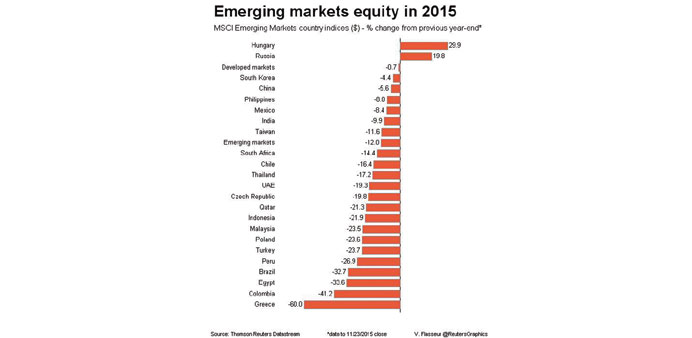Reuters
London
Turkey’s stocks fell 2% and its debt insurance costs rose after it shot down a Russian warplane near the Syrian border, while other emerging assets also struggled in face of a strong dollar and weak commodities.
MSCI’s benchmark emerging equity index was down about 0.25%, with Hong Kong-listed Chinese stocks down 0.3% as the dollar stayed near eight-month peaks.
Turkish stocks hit their lowest since end-October after the Russian jet was downed, while five-year Turkish debt insurance costs rose to their highest level since mid-November, according to Markit data, and Eurobond prices fell across the curve.
Moscow-listed equities tumbled more than 1.5%, while Polish stocks extended losses to hit new 6-1/2-year lows on the back of heavy losses in copper smelting giant KGHM.
UBS strategist Manik Narain said the emerging markets bounce since September had been driven by a recovery in US equities and the Chinese yuan, support that is now fading.
“We have seen the yuan pulling back and US equities are struggling for direction, all of which is leading to some consolidation in EM,” Narain said.
He played down the impact of the warplane incident, predicting it to be short-lived. He said the appointment of a new Turkish cabinet was of greater importance for markets.
The lira lost 0.6% against the dollar ahead of a central bank meeting, which is expected to keep rates on hold at 7.5%.
“The bank has linked any rate-related moves to the start of the Fed lift-off and, given that ING expects a December hike, the first CBT move might come later, in the last month of 2015 or the first month of 2016,” analysts at ING said in a note.
The market is also waiting to see if Turkey’s new cabinet will be composed of technocrats committed to fiscal discipline or Erdogan loyalists likely to pursue a more populist agenda, and what role former deputy prime minister Ali Babacan will take.
“If Babacan gets a less important post it will raise concerns about the direction of economic policy,” Narain said.
Other currencies were mostly lower, with the Russian rouble at a one-week low against the dollar, even though Brent crude futures rose 1.3% to over $45 a barrel.
Oil firmed after Saudi Arabia indicated it was ready to co-operate with other producers to achieve market stability, raising expectations of a supply cut.
However, pressure mounted further on the riyal in the one-year forward markets, with the currency hitting new 12-year lows.
Other commodity exporters also struggled. The South African rand slipped 0.2% after third-quarter GDP data showed the economy grew by just 0.7%, less than expected.
Nigeria’s central bank meets on Tuesday and is expected to hold rates at 13%. Credit Suisse said the bank was likely to await policy signals from Nigeria’s newly installed cabinet before taking further action.

